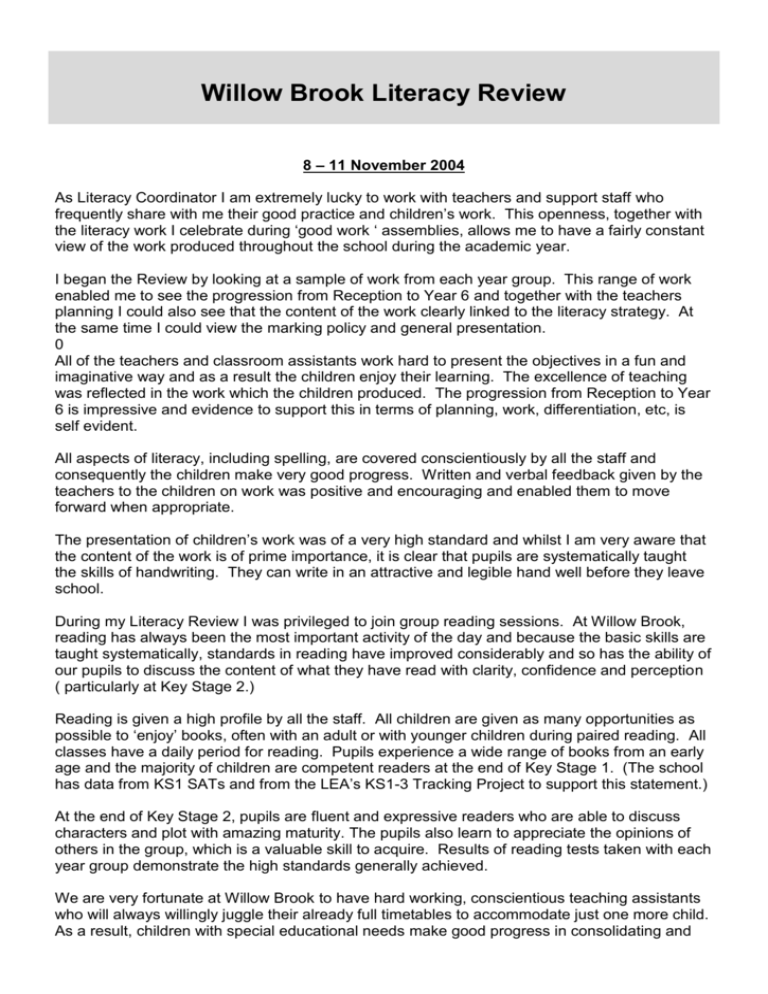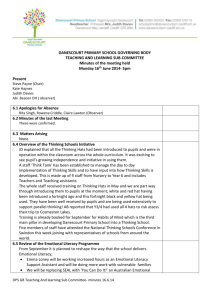Willow Brook Literacy Audit - Willow Brook Primary School
advertisement

Willow Brook Literacy Review 8 – 11 November 2004 As Literacy Coordinator I am extremely lucky to work with teachers and support staff who frequently share with me their good practice and children’s work. This openness, together with the literacy work I celebrate during ‘good work ‘ assemblies, allows me to have a fairly constant view of the work produced throughout the school during the academic year. I began the Review by looking at a sample of work from each year group. This range of work enabled me to see the progression from Reception to Year 6 and together with the teachers planning I could also see that the content of the work clearly linked to the literacy strategy. At the same time I could view the marking policy and general presentation. 0 All of the teachers and classroom assistants work hard to present the objectives in a fun and imaginative way and as a result the children enjoy their learning. The excellence of teaching was reflected in the work which the children produced. The progression from Reception to Year 6 is impressive and evidence to support this in terms of planning, work, differentiation, etc, is self evident. All aspects of literacy, including spelling, are covered conscientiously by all the staff and consequently the children make very good progress. Written and verbal feedback given by the teachers to the children on work was positive and encouraging and enabled them to move forward when appropriate. The presentation of children’s work was of a very high standard and whilst I am very aware that the content of the work is of prime importance, it is clear that pupils are systematically taught the skills of handwriting. They can write in an attractive and legible hand well before they leave school. During my Literacy Review I was privileged to join group reading sessions. At Willow Brook, reading has always been the most important activity of the day and because the basic skills are taught systematically, standards in reading have improved considerably and so has the ability of our pupils to discuss the content of what they have read with clarity, confidence and perception ( particularly at Key Stage 2.) Reading is given a high profile by all the staff. All children are given as many opportunities as possible to ‘enjoy’ books, often with an adult or with younger children during paired reading. All classes have a daily period for reading. Pupils experience a wide range of books from an early age and the majority of children are competent readers at the end of Key Stage 1. (The school has data from KS1 SATs and from the LEA’s KS1-3 Tracking Project to support this statement.) At the end of Key Stage 2, pupils are fluent and expressive readers who are able to discuss characters and plot with amazing maturity. The pupils also learn to appreciate the opinions of others in the group, which is a valuable skill to acquire. Results of reading tests taken with each year group demonstrate the high standards generally achieved. We are very fortunate at Willow Brook to have hard working, conscientious teaching assistants who will always willingly juggle their already full timetables to accommodate just one more child. As a result, children with special educational needs make good progress in consolidating and acquiring new skills whether in a small group situation or individually. Their enthusiasm for the job even extends to costumes and props for the Christmas concert – to say nothing of bringing a Barn Owl to school! Their presence in school depends on finance and I would like to take this opportunity to thank them and make it clear that these children would certainly be at a disadvantage without this extra support. Long may it continue! Information Technology is a rapidly developing aspect of our literacy provision and with the acquisition of interactive whiteboards in every classroom this can only increase. ICT is used to support Literacy objectives where appropriate and enhances the learning for the children. It is clear that the use of ICT to support Literacy while currently used extensively will continue to develop even more as the staff becomes increasingly confident in their use of new ICT resources. Literacy has always enjoyed generous funding at Willow Brook (this is a necessity – books are expensive!) Each year books are updated or replaced. This year I would like to look at the provision of fiction and non-fiction reading material in every classroom and begin to rejuvenate present stocks. I must congratulate pupils for the care taken with books. It is obvious that staff and parents encourage and teach the importance of looking after our books as I never find a book which has been deliberately damaged. The school’s Literacy Policy and Scheme of Work are currently being updated to reflect changes and developments with the literacy strategy at Willow Brook. All staff have endeavoured to make the literacy strategy work for us rather than adopting a generic scheme which may not be entirely suited to our own children’s needs. We have moved on massively from the initial implementation of the strategy and it is quite clear that we have ownership of our ‘own’ strategy. To conclude, I would like to thank the staff for their hard work in promoting Literacy as an enjoyable area of the curriculum, enabling our children to be competent readers and writers, giving them the very best start in the next stage of their education. Chris Osborne 10 November 2004







